Romeo and Juliet
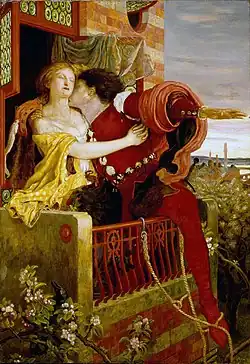
The Tragedy of Romeo and Juliet, often shortened to Romeo and Juliet, is a love tragedy written by William Shakespeare early in his career about the romance between two Italian youths from feuding families.
- W. G. Clark; W. A. Wright (eds.) The Works of William Shakespeare, vol. 7 (Cambridge and London: Macmillan and Co., 1865)
Prologue
- Two households, both alike in dignity,
In fair Verona, where we lay our scene,
From ancient grudge break to new mutiny,
Where civil blood makes civil hands unclean.
From forth the fatal loins of these two foes
A pair of star-cross'd lovers take their life;
Whose misadventured piteous overthrows
Do with their death bury their parents' strife.- Chorus, l. 1
Act I
Scene i
- Sampson: I will take the wall of any man or maid of Montague's.
Gregory: That shows thee a weak slave; for the weakest goes to the wall.
Sampson: 'Tis true; and therefore women, being the weaker vessels, are ever thrust to the wall: therefore I will push Montague's men from the wall and thrust his maids to the wall.- l. 11
- Sampson: When I have fought with the men, I will be cruel with the maids; I will cut off their heads.
Gregory: The heads of the maids?
Sampson: Ay, the heads of the maids, or their maidenheads; take it in what sense thou wilt.- l. 21
- Abraham: Do you bite your thumb at us, sir?
Sampson: I do bite my thumb, sir.
Abraham: Do you bite your thumb at us, sir?
Sampson: [Aside to to Gregory] Is the law of our side, if I say ay?
Gregory: No.
Sampson: No, sir, I do not bite my thumb at you, sir; but I bite my thumb, sir.- l. 43
- Gregory, remember thy swashing blow.
- Sampson, l. 60
- What, drawn, and talk of peace! I hate the word,
As I hate hell, all Montagues, and thee.- Tybalt, l. 68
- Three civil brawls, bred of an airy word,
By thee, old Capulet, and Montague,
Have thrice disturb'd the quiet of our streets,
And made Verona's ancient citizens
Cast by their grave beseeming ornaments,
To wield old partisans, in hands as old,
Canker'd with peace, to part your canker'd hate.- Prince, l. 87
- An hour before the worshipp'd sun
Peer'd forth the golden window of the east.- Benvolio, l. 116
- But to himself so secret and so close,
So far from sounding and discovery,
As is the bud bit with an envious worm,
Ere he can spread his sweet leaves to the air,
Or dedicate his beauty to the sun.- Montague, l. 147
- Benvolio: What sadness lengthens Romeo's hours?
Romeo: Not having that which, having, makes them short.
Benvolio: In love?
Romeo: Out—
Benvolio: Of love?
Romeo: Out of her favour, where I am in love.- l. 161
- Why, then, O brawling love! O loving hate!
O any thing, of nothing first create!
O heavy lightness! serious vanity!
Mis-shapen chaos of well-seeming forms!- Romeo, l. 174
- Griefs of mine own lie heavy in my breast;
Which thou wilt propagate, to have it prest
With more of thine.- Romeo, l. 184
- Love is a smoke raised with the fume of sighs;
Being purged, a fire sparkling in lovers' eyes;
Being vex'd, a sea nourish'd with lovers' tears:
What is it else? a madness most discreet,
A choking gall and a preserving sweet.- Romeo, l. 188
- From love's weak childish bow she lives unharm'd.
- Romeo, l. 209
- Folio and early editions: "Uncharmed" instead of "unharmed"
- Romeo, l. 209
- He that is strucken blind cannot forget
The precious treasure of his eyesight lost.- Romeo, l. 230
Scene ii
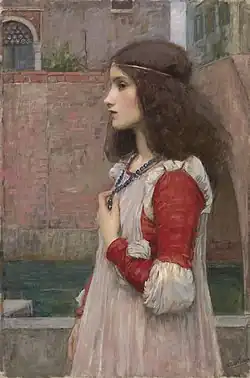
- My child is yet a stranger in the world;
She hath not seen the change of fourteen years:
Let two more summers wither in their pride
Ere we may think her ripe to be a bride.- Capulet, l. 8
- This night I hold an old accustom'd feast,
Whereto I have invited many a guest,
Such as I love; and you among the store,
One more, most welcome, makes my number more.- Capulet, l. 20
- One fire burns out another's burning,
One pain is lessen'd by another's anguish.- Benvolio, l. 45
- Compare her face with some that I shall show,
And I will make thee think thy swan a crow.- Benvolio, l. 86
- One fairer than my love! the all-seeing sun
Ne'er saw her match since first the world begun.- Romeo, l. 92
Scene iii
- That book in many's eyes doth share the glory,
That in gold clasps locks in the golden story.- Lady Capulet, l. 92
- God mark thee to his grace!
Thou wast the prettiest babe that e'er I nursed:
An I might live to see thee married once,
I have my wish.- Nurse, l. 60
- Why, he's a man of wax.
- Nurse, l. 77
Scene iv
- Romeo: Is love a tender thing? it is too rough,
Too rude, too boisterous, and it pricks like thorn.
Mercutio: If love be rough with you, be rough with love;
Prick love for pricking, and you beat love down.- l. 25
- Romeo: I dreat a dream to-night.
Mercutio: And so did I.
Romeo: Well, what was yours?
Mercutio: That dreamers often lie.- l. 49
- O, then, I see Queen Mab hath been with you.
She is the fairies' midwife, and she comes
In shape no bigger than an agate-stone
On the fore-finger of an alderman,
Drawn with a team of little atomies
Athwart men’s noses as they lie asleep:
Her waggon-spokes made of long spinners' legs;
The cover, of the wings of grasshoppers;
Her traces, of the smallest spider's web;
Her collars, of the moonshine's watery beams;
Her whip, of cricket's bone; the lash, of film;
Her waggoner, a small grey-coated gnat,
Not half so big as a round little worm
Prick'd from the lazy finger of a maid:
Her chariot is an empty hazel-nut,
Made by the joiner squirrel or old grub,
Time out o' mind the fairies' coachmakers:
And in this state she gallops night by night
Through lovers' brains, and then they dream of love;
O'er courtiers' knees, that dream on court'sies straight;
O'er lawyers' fingers, who straight dream on fees;
O'er ladies' lips, who straight on kisses dream,
Which oft the angry Mab with blisters plagues,
Because their breaths with sweetmeats tainted are:
Sometime she gallops o'er a courtier's nose,
And then dreams he of smelling out a suit;
And sometime comes she with a tithe-pig's tail
Tickling a parson's nose as a' lies asleep,
Then he dreams of another benefice:
Sometime she driveth o'er a soldier's neck,
And then dreams he of cutting foreign throats,
Of breaches, ambuscadoes, Spanish blades,
Of healths five fathom deep; and then anon
Drums in his ear, at which he starts and wakes,
And being thus frighted swears a prayer or two,
And sleeps again. This is that very Mab
That plats the manes of horses in the night
And bakes the elf-locks in foul sluttish hairs,
Which once untangled much misfortune bodes:
This is the hag, when maids lie on their backs,
That presses them and learns them first to bear,
Making them women of good carriage.- Mercutio, l. 54
- Romeo: Peace, peace, Mercutio, peace!
Thou talk'st of nothing.
Mercutio: True, I talk of dreams;
Which are the children of an idle brain,
Begot of nothing but vain fantasy,
Which is as thin of substance as the air,
And more inconstant than the wind, who wooes,
Even now the frozen bosom of the north,
And, being anger'd, puffs away from thence,
Turning his face to the dew-dropping south.- l. 95
- But He, that hath the steerage of my course,
Direct my sail!- Romeo, l. 112
- "Direct my suit" in folio and quarto of 1690
- Romeo, l. 112
Scene v
- Nay, sit, nay, sit, good cousin Capulet;
For you and I are past our dancing days.- Capulet, l. 28
- Cf. Beaumont and Fletcher, The Scornful Lady, act 5, sc. 3: "My dancing days are done."
- Capulet, l. 28
- O, she doth teach the torches to burn bright!
It seems she hangs upon the cheek of night
Like a rich jewel in an Ethiope's ear;
Beauty too rich for use, for earth too dear!- Romeo, l. 42
- Later editions read: "Her beauty hangs upon the cheek of night."
- Romeo, l. 42
- So shows a snowy dove trooping with crows.
- Romeo, l. 46
- Did my heart love till now? Forswear it, sight!
For I ne'er saw true beauty till this night.- Romeo, l. 50
- You kiss by the book.
- Juliet, l. 107
- My only love sprung from my only hate!
Too early seen unknown, and known too late!- Juliet, l. 136
Act II
Prologue
- Steal love's sweet bait from fearful hooks.
- But passion lends them power, time means, to meet,
Tempering extremities with extreme sweet.- Chorus, l. 13
Scene i
- Speak but one rhyme, and I am satisfied;
Cry but 'ay me!' pronounce but 'love' and 'dove.'- Mercutio, l. 9
Scene ii
- He jests at scars that never felt a wound.
- Romeo, l. 1
- But, soft! what light through yonder window breaks?
It is the east, and Juliet is the sun!- Romeo, l. 2
- See, how she leans her cheek upon her hand!
O, that I were a glove upon that hand,
That I might touch that cheek!- Romeo, l. 23
- Shirley, in The Schoole of Complement, act 3, sc. 1, writes, "Oh that I were a flea upon thy lip." And Marmion, in The Antiquary, act 2, sc. 1: "O that I were a veil upon that face!" Cf. the anon. Gk. frag. in Athenaeus, bk. 15, sec. 695d
- Romeo, l. 23
- O Romeo, Romeo! wherefore art thou Romeo?
Deny thy father and refuse thy name;
Or, if thou wilt not, be but sworn my love,
And I'll no longer be a Capulet.- Juliet, l. 33
_12000px.jpg)
- 'Tis but thy name that is my enemy;
Thou art thyself, though not a Montague.
What's Montague? it is nor hand, nor foot,
Nor arm, nor face, nor any other part
Belonging to a man. O, be some other name!
What's in a name? that which we call a rose
By any other name would smell as sweet;
So Romeo would, were he not Romeo call'd,
Retain that dear perfection which he owes
Without that title. Romeo, doff thy name,
And for thy name, which is no part of thee,
Take all myself.
- I take thee at thy word:
Call me but love, and I'll be new baptized;
Henceforth I never will be Romeo.- Romeo, l. 49
.jpg)
And what love can do, that dares love attempt.
- For stony limits cannot hold love out:
And what love can do, that dares love attempt.- Romeo, l. 67
- Alack, there lies more peril in thine eye
Than twenty of their swords.- Romeo, l. 71
- At lovers' perjuries,
They say, Jove laughs.- Juliet, l. 92
- Cf. Pseudo-Tibullus, bk. 3, no. 6, l. 49; Ovid, Ars Amatoria, bk. 1, no. 633; Massinger, The Great Duke of Florence, act 2, sc. 3; Dryden, Palamon and Arcite, bk. 2, l. 75, and Amphitron, act 1, sc. 2
- Juliet, l. 92
- O, swear not by the moon, th' inconstant moon,
That monthly changes in her circled orb,
Lest that thy love prove likewise variable.- Juliet, l. 109
- Do not swear at all;
Or, if thou wilt, swear by thy gracious self,
Which is the god of my idolatry.- Juliet, l. 112
- Too like the lightning, which doth cease to be
Ere one can say 'It lightens.'- Juliet, l. 119
- Romeo: O, wilt thou leave me so unsatisfied?
Juliet: What satisfaction canst thou have to-night?
Romeo: The exchange of thy love's faithful vow for mine.
Juliet: I gave thee mine before thou didst request it:
And yet I would it were to give again.
Romeo: Wouldst thou withdraw it? for what purpose, love?
Juliet: But to be frank, and give it thee again.
And yet I wish but for the thing I have:
My bounty is as boundless as the sea,
My love as deep; the more I give to thee,
The more I have, for both are infinite.- l. 125
- Love goes toward love, as schoolboys from their books,
But love from love, toward school with heavy looks.- Romeo, l. 156
- It is my soul that calls upon my name:
How silver-sweet sound lovers' tongues by night,
Like softest music to attending ears!- Romeo, l. 165
- And I'll still stay, to have thee still forget,
Forgetting any other home but this.- Romeo, l. 175
- 'Tis almost morning; I would have thee gone:
And yet no farther than a wanton's bird,
Who lets it hop a little from her hand,
Like a poor prisoner in his twisted gyves,
And with a silk thread plucks it back again,
So loving-jealous of his liberty.
- Good night, good night! parting is such sweet sorrow
That I shall say good night till it be morrow.- Juliet, l. 185
Scene iii
- The grey-eyed morn smiles on the frowning night,
Chequering the eastern clouds with streaks of light.- Friar Laurence, l. 1
- The earth that's nature's mother is her tomb;
What is her burying grave, that is her womb.- Friar Laurence, l. 9
- For nought so vile that on the earth doth live,
But to the earth some special good doth give;
Nor aught so good, but, strain'd from that fair use,
Revolts from true birth, stumbling on abuse:
Virtue itself turns vice, being misapplied,
And vice sometime's by action dignified.- Friar Laurence, l. 17
- Care keeps his watch in every old man's eye,
And where care lodges, sleep will never lie;
But where unbruised youth with unstuff'd brain
Doth couch his limbs, there golden sleep doth reign.- Friar Laurence, l. 35
- Then plainly know my heart's dear love is set
On the fair daughter of rich Capulet:
As mine on hers, so hers is set on mine;
And all combined, save what thou must combine
By holy marriage: when, and where, and how,
We met, we woo'd and made exchange of vow,
I'll tell thee as we pass; but this I pray,
That thou consent to marry us to-day.- Romeo, to Friar Laurence, l. 57
- Holy Saint Francis, what a change is here!
Is Rosaline, whom thou didst love so dear,
So soon forsaken? young men's love then lies
Not truly in their hearts, but in their eyes.- Friar Laurence, to Romeo, l. 65
- Wisely and slow; they stumble that run fast.
- Friar Laurence, to Romeo, l. 94
Scene iv
- I am the very pink of courtesy.
- Mercutio, l. 54
- Thy wit is a very bitter sweeting; it is a most sharp sauce.
- Mercutio, l. 74
- A gentleman, nurse, that loves to hear himself talk, and will speak more in a minute than he will stand to in a month.
- Romeo, l. 138
Scene v
- Love's heralds should be thoughts,
Which ten times faster glide than the sun's beams
Driving back shadows over louring hills:
Therefore do nimble-pinion'd doves draw love,
And therefore hath the wind-swift Cupid wings.- Juliet, l. 4
Scene vi
- These violent delights have violent ends
And in their triumph die, like fire and powder
Which as they kiss consume.- Friar Laurence, l. 9
- The sweetest honey
Is loathsome in his own deliciousness
And in the taste confounds the appetite.- Friar Laurence, l. 11
- Therefore, love moderately; long love doth so;
Too swift arrives as tardy as too slow.- Friar Laurence, l. 14
- O, so light a foot
Will ne'er wear out the everlasting flint.- Friar Laurence, l. 16
- Conceit, more rich in matter than in words,
Brags of his substance, not of ornament:
They are but beggars that can count their worth.- Friar Laurence, l. 30
Act III
Scene i
- The day is hot, the Capulets abroad,
And, if we meet, we shall not 'scape a brawl;
For now these hot days is the mad blood stirring.- Benvolio, l. 2
- Thou art as hot a Jack in thy mood as any in Italy, and as soon moved to be moody and as soon moody to be moved.
- Mercutio, to Benvolio, l. 11
- Thou! why, thou wilt quarrel with a man that hath a hair more, or a hair less, in his beard than thou hast: thou wilt quarrel with a man for cracking nuts, having no other reason but because thou hast hazel eyes.
- Mercutio, l. 16
- Thy head is as full of quarrels as an egg is full of meat.
- Mercutio, l. 21
- Romeo, the hate I bear thee can afford
No better term than this,—thou art a villain.- Tybalt, l. 57
- Mercutio: O calm, dishonourable, vile submission!
Alla stoccata carries it away. [Draws.
Tybalt, you rat-catcher, will you walk?
Tybalt: What wouldst thou have with me?
Mercutio: Good king of cats, nothing but one of your nine lives.- l. 70
- I am hurt;
A plague o' both your houses! I am sped.- Mercutio, l. 87
- Benvolio: What, art thou hurt?
Mercutio: Ay, ay, a scratch, a scratch; marry, 'tis enough.- l. 88
- Romeo: Courage, man; the hurt cannot be much.
Mercutio: No, 'tis not so deep as a well, nor so wide as a church-door; but 'tis enough, 'twill serve: ask for me to-morrow, and you shall find me a grave man. I am peppered, I warrant, for this world. A plague o' both your houses!- l. 91
- Mercutio: Why the devil came you between us? I was hurt under your arm.
Romeo: I thought all for the best.
Mercutio: Help me into some house, Benvolio,
Or I shall faint. A plague o' both your houses!
They have made worms' meat of me: I have it,
And soundly too: your houses!- l. 98
- This gentleman, the prince's near ally,
My very friend, hath got this mortal hurt
In my behalf; my reputation stain'd
With Tybalt's slander,—Tybalt, that an hour
Hath been my kinsman: O sweet Juliet,
Thy beauty hath made me effeminate,
And in my temper soften'd valour's steel!- Romeo, l. 105
- O, I am fortune's fool!
- Romeo, l. 132
- Lady Capulet: I beg for justice, which thou, prince, must give;
Romeo slew Tybalt, Romeo must not live.
Prince: Romeo slew him, he slew Mercutio;
Who now the price of his dear blood doth owe?
Montague: Not Romeo, prince, he was Mercutio's friend;
His fault concludes but what the law should end,
The life of Tybalt.
Prince: And for that offence
Immediately we do exile him hence:
I have an interest in your hate's proceeding,
My blood for your rude brawls doth lie a-bleeding;
But I'll amerce you with so strong a fine,
That you shall all repent the loss of mine:
I will be deaf to pleading and excuses;
Nor tears nor prayers shall purchase out abuses:
Therefore use none: let Romeo hence in haste,
Else, when he's found, that hour is his last.
Bear hence this body, and attend our will:
Mercy but murders, pardoning those that kill.
- Sl. 176
Scene ii
- Come, gentle night, come, loving, black-brow'd night,
Give me my Romeo; and, when he shall die,
Take him and cut him out in little stars,
And he will make the face of Heaven so fine
That all the world will be in love with night
And pay no worship to the garish sun.- Juliet, l. 20
- So tedious is this day
As is the night before some festival
To an impatient child that hath new robes
And may not wear them.- Juliet, l. 28
- Every tongue that speaks
But Romeo's name speaks heavenly eloquence.- Juliet, l. 32
- O, break, my heart! poor bankrupt, break at once!
To prison, eyes, ne'er look on liberty!
Vile earth, to earth resign, end motion here,
And thou and Romeo press one heavy bier!- Juliet, l. 57
- O serpent heart, hid with a flowering face!
Did ever dragon keep so fair a cave?
Beautiful tyrant! fiend angelical!
Dove-feather'd raven! wolvish-ravening lamb! ...
A damned saint, an honourable villain!- Juliet, l. 73
- O, that deceit should dwell
In such a gorgeous palace!- Juliet, l. 84
- There's no trust,
No faith, no honesty in men; all are perjured,
All forsworn, all naught, all dissemblers.- Nurse, l. 86
- He was not born to shame:
Upon his brow shame is ashamed to sit;
For 'tis a throne where honour may be crown'd
Sole monarch of the universal earth.- Juliet, l. 91
Scene iii
- Affliction is enamour'd of thy parts,
And thou art wedded to calamity.- Friar Laurence, l. 3
- O deadly sin! O rude unthankfulness!
- Friar Laurence, l. 24
- They may seize
On the white wonder of dear Juliet's hand.- Juliet, l. 35
- 'Banished'?
O friar, the damned use that word in hell;
Howling attends it: how hast thou the heart,
Being a divine, a ghostly confessor,
A sin-absolver, and my friend profess'd,
To mangle me with that word 'banished'?- Juliet, l. 46
- Adversity's sweet milk, philosophy.
- Friar Laurence, l. 55
- Taking the measure of an unmade grave.
- Romeo, l. 70
Scene v
- Wilt thou be gone? it is not yet near day:
It was the nightingale, and not the lark,
That pierced the fearful hollow of thine ear;
Nightly she sings on yond pomegranate-tree:
Believe me, love, it was the nightingale.- Juliet, l. 1
- It was the lark, the herald of the morn,
No nightingale: look, love, what envious streaks
Do lace the severing clouds in yonder east:
Night's candles are burnt out, and jocund day
Stands tiptoe on the misty mountain tops:
I must be gone and live, or stay and die.- Romeo, l. 6
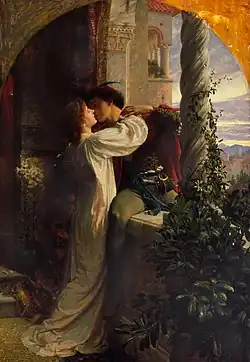
- It is the lark that sings so out of tune,
Straining harsh discords and unpleasing sharps.- Romeo, l. 27
- Farewell, farewell, one kiss and I'll descend.
- Romeo, l. 41
- All these woes shall serve
For sweet discourses in our time to come.- Romeo, l. 52
- O fortune, fortune! all men call thee fickle.
- Juliet, l. 60
- Some grief shows much of love,
But much of grief shows still some want of wit.- Lady Capulet, l. 72
- Villain and he be many miles asunder.
- Juliet, l. 81
- Is there no pity sitting in the clouds,
That sees into the bottom of my grief?- Juliet, l. 197
Act IV
Scene i
- Tell me not, friar, that thou hear'st of this,
Unless thou tell me how I may prevent it:
If in thy wisdom thou canst give no help,
Do thou but call my resolution wise,
And with this knife I'll help it presently.
God join'd my heart and Romeo's, thou our hands;
And ere this hand, by thee to Romeo seal'd,
Shall be the label to another deed,
Or my true heart with treacherous revolt
Turn to another, this shall slay them both:
Therefore, out of thy long-experienced time,
Give me some present counsel; or, behold,
'Twixt my extremes and me this bloody knife
Shall play the umpire, arbitrating that
Which the commission of thy years and art
Could to no issue of true honour bring.
Be not so long to speak; I long to die,
If what thou speak'st speak not of remedy.- Juliet, l. 50
- O, bid me leap, rather than marry Paris,
From off the battlements of yonder tower;
Or walk in thievish ways; or bid me lurk
Where serpents are; chain me with roaring bears;
Or shut me nightly in a charnel-house,
O'er-cover'd quite with dead men's rattling bones,
With reeky shanks and yellow chapless skulls;
Or bid me go into a new-made grave,
And hide me with a dead man in his shroud;
Things that to hear them told, have made me tremble;
And I will do it without fear or doubt.
To live an unstain'd wife to my sweet love.- Juliet, l. 77
- Thy eyes' windows fall,
Like death, when he shuts up the day of life;
Each part, deprived of supple government,
Shall, stiff and stark and cold, appear like death.- Juliet, l. 100
Scene ii
- Hire me twenty cunning cooks.
- Capulet, l. 2
- Not stepping o'er the bounds of modesty.
- Juliet, l. 27
Scene iii
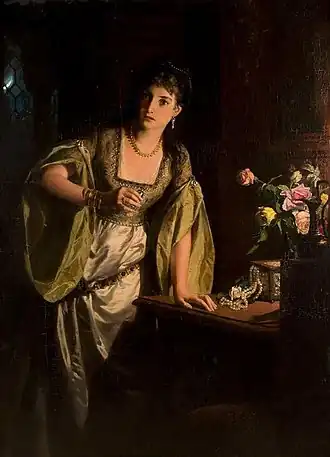
That almost freezes up the heat of life.
- I have a faint cold fear thrills through my veins,
That almost freezes up the heat of life.- Juliet, l. 15
Scene v

Upon the sweetest flower of all the field.
- Death lies on her like an untimely frost
Upon the sweetest flower of all the field.- Capulet, l. 28
- O woe! O woeful, woeful, woeful day!
Most lamentable day, most woeful day,
That ever, ever, I did yet behold!
O day! O day! O day! O hateful day!
Never was seen so black a day as this:
O woeful day, O woeful day!- Nurse, l. 49
- She's not well married that lives married long,
But she's best married that dies married young.- Friar Laurence, l. 77
- All things that we ordained festival,
Turn from their office to black funeral:
Our instruments to melancholy bells;
Our wedding cheer to a sad burial feast;
Our solemn hymns to sullen dirges change;
Our bridal flowers serve for a buried corse,
And all things change them to the contrary.- Capulet, l. 84
Act V
Scene i
- If I may trust the flattering truth of sleep,
My dreams presage some joyful news at hand:
My bosom's lord sits lightly in his throne,
And all this day an unaccustom'd spirit
Lifts me above the ground with cheerful thoughts.- Romeo, l. 1
- And her immortal part with angels lives.
- Balthasar, l. 19
- O mischief, thou art swift
To enter in the thoughts of desperate men!- Romeo, l. 35
- I do remember an apothecary,
And hereabouts a' dwells, which late I noted
In tatter'd weeds, with overwhelming brows,
Culling of simples; meagre were his looks;
Sharp misery had worn him to the bones:
And in his needy shop a tortoise hung,
An alligator stuff'd and other skins
Of ill-shaped fishes; and about his shelves
A beggarly account of empty boxes,
Green earthen pots, bladders and musty seeds,
Remnants of packthread and old cakes of roses,
Were thinly scatter'd, to make up a show.
Noting this penury, to myself I said,
An if a man did need a poison now,
Whose sale is present death in Mantua,
Here lives a caitiff wretch would sell it him.- Romeo, l. 37
- Being holiday, the beggar's shop is shut.
- Romeo, l. 56
- Let me have
A dram of poison; such soon-speeding gear
As will disperse itself through all the veins,
That the life-weary taker may fall dead,
And that the trunk may be discharged of breath
As violently as hasty powder fired
Doth hurry from the fatal cannon's womb.- Romeo, l. 59
- The world affords no law to make thee rich;
Then be not poor, but break it, and take this.- Romeo, l. 73
- There is thy gold, worse poison to men's souls,
Doing more murder in this loathsome world,
Than these poor compounds that thou mayst not sell:
I sell thee poison, thou hast sold me none.- Romeo, l. 80
Scene iii
- Her beauty makes
This vault a feasting presence full of light.
Death, lie thou there, by a dead man interr'd.- Romeo, l. 85
- How oft when men are at the point of death
Have they been merry! which their keepers call
A lightning before death.- Romeo, l. 88
- Death, that hath suck'd the honey of thy breath,
Hath had no power yet upon thy beauty:
Thou art not conquer'd; beauty's ensign yet
Is crimson in thy lips and in thy cheeks,
And death's pale flag is not advanced there.- Romeo, l. 92
- Cf. Richard Johnson, Seven Champions, pt. 3, ch. 11
- Romeo, l. 92
- Shall I believe
That unsubstantial death is amorous,
And that the lean abhorrèd monster keeps
Thee here in the dark to be his paramour?- Romeo, l. 102
- Eyes, look your last!
Arms, take your last embrace! and, lips, O you
The doors of breath, seal with a righteous kiss
A dateless bargain to engrossing death!- Romeo, l. 112
- O true apothecary!
Thy drugs are quick. Thus with a kiss I die.- Romeo, l. 119
- Yea, noise? then I'll be brief. O happy dagger!
This is thy sheath; there rest, and let me die.- Juliet, l. 169
- Where be these enemies? Capulet! Montague!
See, what a scourge is laid upon your hate,
That heaven finds means to kill your joys with love!
And I, for winking at your discords too,
Have lost a brace of kinsmen: all are punish'd.- Prince, l. 290
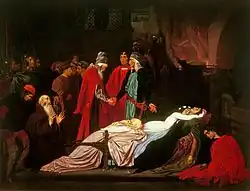
Than this of Juliet and her Romeo.
- A glooming peace this morning with it brings;
The sun for sorrow will not show his head:
Go hence, to have more talk of these sad things;
Some shall be pardon'd and some punishèd:
For never was a story of more woe
Than this of Juliet and her Romeo.- Prince, l. 304
External links
 Encyclopedic article on Romeo and Juliet on Wikipedia
Encyclopedic article on Romeo and Juliet on Wikipedia Works related to Romeo and Juliet on Wikisource
Works related to Romeo and Juliet on Wikisource